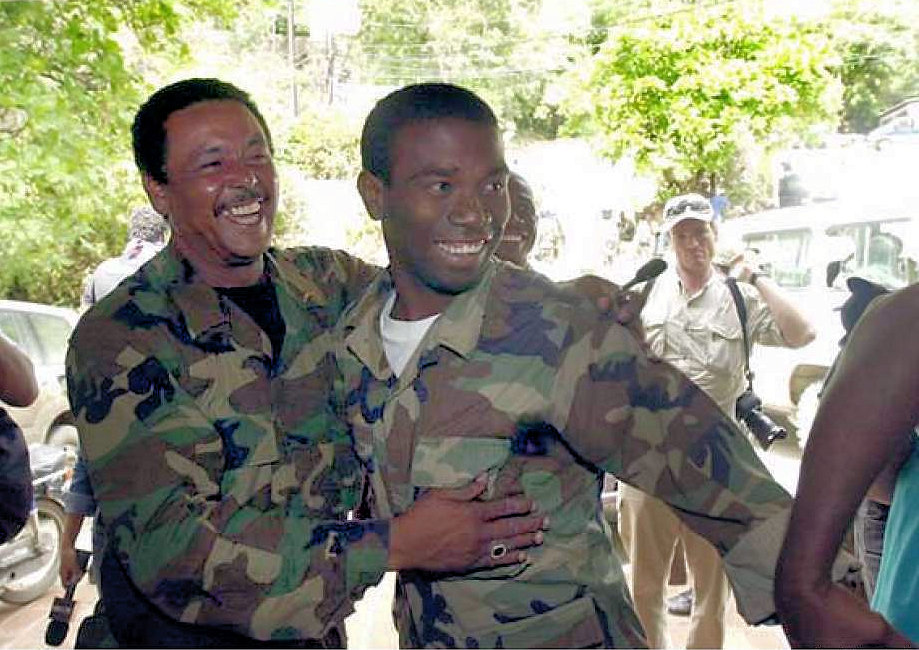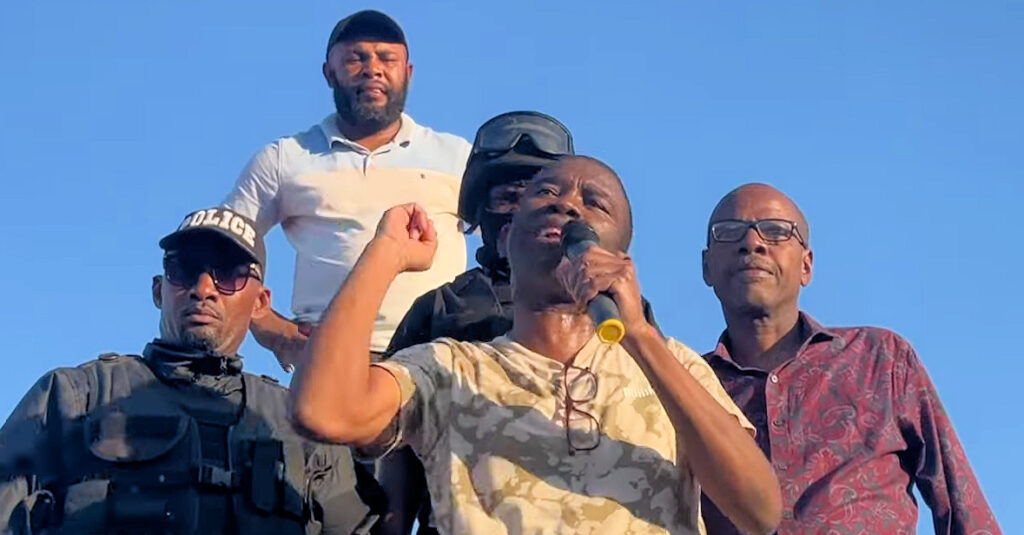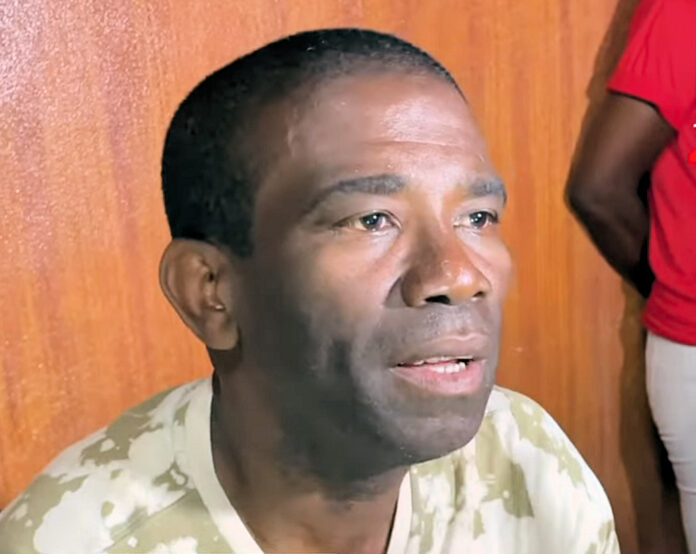(Français)
The former leader of the “armed wing” of the U.S. and French-backed coalition which drove President Jean-Bertrand Aristide from power in February 2004, Guy Philippe, 55, was returned to Haiti along with 16 other Haitian deportees on a U.S. Department of Homeland Security-chartered flight from Alexandria, LA to Port-au-Prince on Nov. 30.
The timing of his arrival could not be better for him or worse for the government of de facto Prime Minister Ariel Henry.
Philippe has bitterly denounced Henry and his government as “U.S. tools” and Henry’s Oct. 9, 2021 call for foreign military intervention, proposing instead that Haitians organize themselves, alongside the Haitian police and army, to reestablish security in the country, elect a new government independent of all foreign involvement, and revitalize the economy.
Furthermore, the head of his party, the National Consortium of Haitian Political Parties (CNPPH), Jeantel Joseph, is the chief of the Brigade for Surveillance of Protected Spaces (BSAP), a police unit founded by President Jovenel Moïse to guard Haiti’s national parks. In recent months, BSAP officers have been providing security for the large crews constructing an irrigation canal off the Massacre River along Haiti’s northeast border with the Dominican Republic. The BSAP cops had a tense standoff with Dominican troops menacing the canal’s construction last month, thereby earning them the support and admiration of Haitians worldwide. In recent weeks, the BSAP’s ranks have swelled to over 15,000 nationwide, according to a well-placed source who works with the Haitian National Police (PNH), although most of the new recruits are unarmed and unpaid. But they are rapidly being armed, and Guy Philippe sees a future for them as a sort of popular militia that can be a surrogate or support for the PNH and Haitian army.
“I am working for a radical change, profound change,” he said. “Stop thinking that the blan (foreigners) are going to help us. They are not going to help us. If they were, they would have done so already.”
Although saying that the path ahead will not be easy, Philippe has said that kidnapping and insecurity could be stopped “in 90 days.”
His statements, in several packed, impromptu press conferences since his return, have aroused many Haitians who have longed for a strong, charismatic leader to steer a course for them out of the impasse in which they have found themselves for the past two and a half years since President Jovenel Moïse’s grisly assassination on Jul. 7, 2021.

Nowhere were those impassioned hopes more on display than during Philippe’s arrival this week in Jérémie, the seat of his native Grand’Anse Department on Haiti’s southwestern tip, where he received a rapturous hero’s welcome.
Haitian police, working closely with clandestine U.S. Drug Enforcement Agency (DEA) agents, ambushed and arrested Philippe on Jan. 5, 2017 outside Garry Pierre-Paul’s Scoop FM radio station, where he had just given an interview. Philippe was the Grand’Anse’s Senator-elect and would have been sworn in and assumed his immunity-conferring parliamentary seat a month later, on Feb. 7, 2017.
Philippe had been charged in a sealed November 2005 indictment with drug trafficking and money laundering but had evaded at least 10 attempts by DEA agents over the previous decade to capture him near his base in the picturesque seaside village of Pestel.
Finally caught, Haitian cops and DEA agents hustled him to a waiting plane on which he was flown to Miami and arraigned.
On the advice of his lawyer, Philippe cut a deal in April 2017 with prosecutors to plead guilty only to money laundering charges, thereby avoiding the danger of conviction on drug trafficking charges which could have carried a life sentence. Instead, he was sentenced in June 2017 to only nine years, with early release for good conduct. He spent six years and 10 months in U.S. jails.
Nonetheless, he has always refuted the charges against him, especially those for drug trafficking, which, he has argued on the radio and through his lawyer, were very flimsy and circumstantial, based on “false evidence and perjured testimony.” He even brought a civil rights lawsuit in 2018 to overturn his conviction and receive $100 million in damages. He later withdrew it with the option to refile.
“If there’s somebody destroying the country, it’s the foreigners.”
Former U.S. officials have expressed worry that Philippe’s arrival in Haiti will make the already chaotic situation worse. (The secret U.S. Embassy cables which Wikileaks provided to Haïti Liberté in 2011 gave a glimpse of the State Department’s view of Guy Philippe, presented in a 2016 series of articles.)
“I’m not close enough to the situation to comment on the facts, but this does seem a particularly bad time to add gasoline to a raging fire,” former U.S. Ambassador to Haiti James Foley told the Miami Herald. Foley served in the post from 2003 to 2005, when Philippe was waging war on Aristide.
Luis Moreno, who was the U.S. deputy chief of mission who forced Aristide onto an unmarked U.S. government plane on Feb. 29, 2004, was also appalled that Philippe was sent back to Haiti.
“It’s incomprehensible how anyone could think this was a good idea,” he told the Herald. “He still has influence. He still has guns. He still has access to narco-trafficking. He also has intense political aspirations and ambitions. He wants to be the ruler of Haiti, he wants to be the dictator of Haiti. It has always been his dream and his objective. And that’s dangerous.”
The assessment of U.S. officials is surely colored by the fact that Philippe often presents Hugo Chavez, Fidel Castro, and Nelson Mandela, as his political models.
While many Haitians are enthralled by Philippe’s revolutionary heroes and nationalist rhetoric, many are also leery about, if not disgusted by, the role he played in the 2001-2004 coup d’état. (He won only 1.92% of the vote in his 2006 presidential bid.)
While today denouncing foreign powers, Haiti’s corrupt “political class,” and its treacherous bourgeoisie, Philippe worked closely with all of them, even recruiting former death-squad leader Louis Jodel Chamblain, to overthrow Haiti’s incontestably elected, overwhelmingly popular President Aristide over a bloody three year military campaign, which claimed the lives of hundreds of Haitian police officers, cadets, and civilians.
In 2007, Peter Hallward, the author of Damming the Flood: Haiti and the Politics of Containment, the definitive account of the 2001-2004 coup d’état, conducted a long interview with Philippe.
“If I fought so fiercely against Aristide it’s because I really believed in what he was saying, back in 1990,” Philippe told Hallward. “I really thought he was going to help the poor to escape their misery; unfortunately he let himself be bought, and he didn’t turn out to be the Castro or the [Thomas] Sankara that we needed. It was a real disappointment.”
Throughout the interview, Philippe refers to a book, Le Temps des chiens (The Time of Dogs), that he claimed to have already written but was waiting to publish. Until now, it has not seen the light of day, and Hallward’s interview remains the principal account of Philippe’s version of his motives and actions during that turbulent period of Aristide’s second overthrow.
Although there have been many reports that Washington and Santo Domingo provided Philippe with weapons, funding, and even training, he denies it.
“The Haitian elite and the political parties in the [political opposition’s Democratic] Convergence helped us with money and weapons,” Philippe told Hallward. “Some leading Haitian businessmen met with us, and in Cap Haïtien for instance they donated around $50,000 (US). Getting hold of money was not a problem…. Yes, we had meetings with various businessmen and they helped us. In Gonaïves, we met with several businessmen and via [another ‘rebel’ leader] Ravix [Rémissainthe] they contributed around $200,000 (US) to buy arms and ammunition. The businessmen seemed keen to help us at all costs.”
But in the end, Philippe became bitter against politicians like Evans Paul and Himmler Rébu, along with the National Endowment for Democracy (NED)-concocted “Group of 184″ civil society front, headed by assembly industry magnate Andy Apaid.

“Under international pressure, they then betrayed us, and they signed the tripartite accord on 4 March [2004], which decided on the procedure for choosing a post-Aristide government,” Philippe complained to Hallward. “And it was them, and Andy Apaid, who advised the U.S. embassy to kidnap Aristide in order to prevent me, Guy Philippe, from taking power and setting up a government in Haiti like the one that Chávez set up in Venezuela.”
The Haiti of 2023 is not that of two decades ago. There is a new generation, with a different ideological outlook and deeper desperation, looking for political answers and avenues. This means that Guy Philippe’s time may have come, or it may be past.
“He has two major obstacles to overcome,” said a source who knows him well and has worked with him over the years. “The first is a huge ego, and the second is a bad temper. He is very unpredictable, and he’s going to do what he wants. He’s not good at taking advice.”
Philippe can be expected to dominate Haiti’s political scene for at least the next few months.
“I see that people everywhere are in misery. I know it, hear it, and see it. But don’t be discouraged,” he told a giant crowd in Jérémie this week. “Things are not as impossible as they make believe. Haiti can change, Haiti will change, we’ll find our way. The only thing I’ll tell you: since [1915], the foreigners (blan) have put their foot on our neck. They decide who’s in power: they name who’s president, prime minister, minister, police chief, head of the army. Today, the foreigners cross their arms as if it wasn’t they who destroyed the country. If there’s somebody destroying the country, it’s the foreigners. If there’s somebody who’s preventing the country from advancing, it’s the foreigners… If a leader refuses to kneel to take orders from the foreigners, from that day they are going to try to eliminate him, destroy him, make him something he is not.”
At this point, the Haitian people are trying to determine and understand what Guy Philippe really is. Is he a sincere, reformed fighter against social injustice, radicalized by political betrayal and years in the U.S. prison system, or an articulate demagogue who is ready to sacrifice Haitian democracy and lives on the altar of his own ambition, as he did from 2001 to 2004?











[…] Calling for “Radical Change,” Former Coup Leader Guy Philippe Triumphantly Returns to Haiti Haiti Liberte […]
[…] (Anglais) […]
[…] 30: Former coup leader Guy Philippe is returned to Haiti from an almost seven-year prison term in the U.S.. He receives a hero’s welcome and strongly […]
[…] New Haiti” and in speeches to thousands in towns across Haiti over the past month since he returned from almost seven years of imprisonment in the […]
[…] charged with protecting national parks. Observer Kim Ives explains that “Guy Philippe sees a futurefor [the BSAP] as a sort of popular militia that can be a surrogate or support for the PNH (Haitian […]